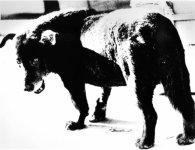FrankS
Registered User
Aspects of a photo:
-content (how compelling - subjective)
-composition (how pleasing - subjective)
-lighting (how interesting and/or appropriate for the subject - subjective)
-extraneous visual elements that do not add to the image (the fewer the better unless the desired effect is chaotic, but then they would add to the image and not be extraneous)
-technical considerations (exposure, focus, brightness, contrast, camera movement, etc. - mostly subjective)
When all of these aspects are favourable, one has a better chance of making a good photo than if some aspects are missing/deficient. When there are several deficiencies, only compelling content is capable of salvaging a photograph. (I'm thinking of Cappa's beach landing war photo.)
What do you think? Do you approach this differently? When I'm shooting or looking at images, I just go with my instincts and intuition, but if I had to verbalize what I look for, this would be it.
-content (how compelling - subjective)
-composition (how pleasing - subjective)
-lighting (how interesting and/or appropriate for the subject - subjective)
-extraneous visual elements that do not add to the image (the fewer the better unless the desired effect is chaotic, but then they would add to the image and not be extraneous)
-technical considerations (exposure, focus, brightness, contrast, camera movement, etc. - mostly subjective)
When all of these aspects are favourable, one has a better chance of making a good photo than if some aspects are missing/deficient. When there are several deficiencies, only compelling content is capable of salvaging a photograph. (I'm thinking of Cappa's beach landing war photo.)
What do you think? Do you approach this differently? When I'm shooting or looking at images, I just go with my instincts and intuition, but if I had to verbalize what I look for, this would be it.
Last edited:






